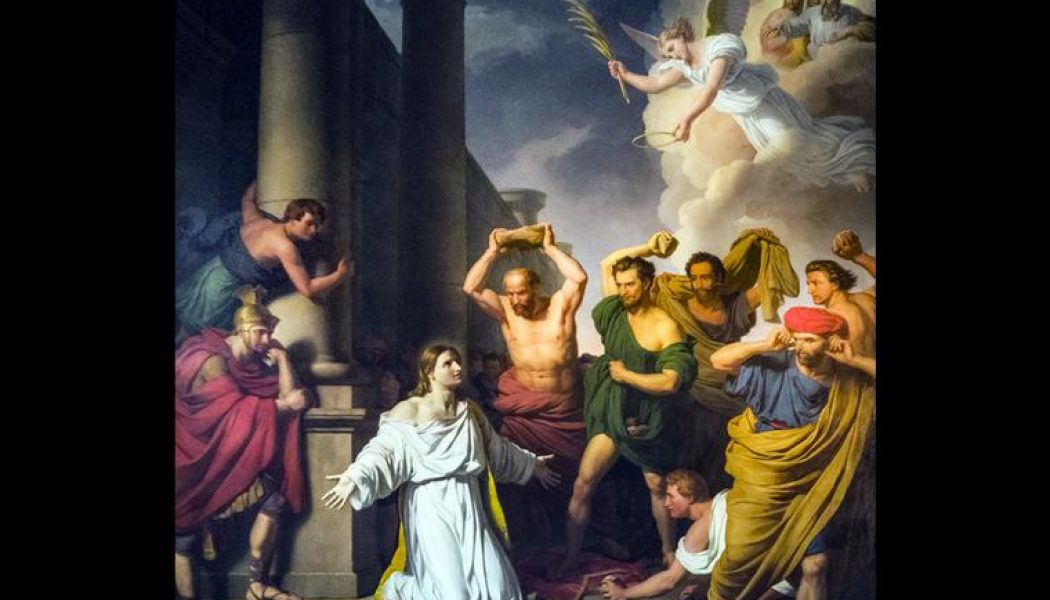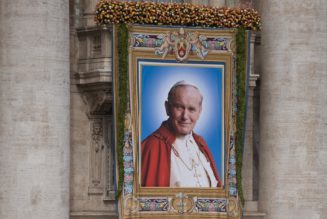
God wants happiness on a personal basis (him and you) that does not end. That’s real happiness.
“Happy” is unlikely an adjective most people associate with Lent. By the First Sunday of Lent, Catholics in the United States will have already experienced their one (of a whole two) fast days of the year and returned to Friday abstinence (which used to be year round). We talk about what we will “give up” for Lent, and we hear of penance. What’s “happy?”
Lots.
Some Catholics might remember that the Fourth Sunday of Lent — Laetare Sunday — is something of a midpoint break, when the Church lets out a hint of joy (and takes out rose vestments, one of only two times during the year). But, I’d argue, there’s even more joy in Lenten Sundays.
At a minimum, that joy is there every week. Laetere Sunday expresses it in the entrance psalm (“Rejoice, Jerusalem …”) and its vestments. But the Second Sunday of Lent gives us a first dose of happiness, because its Gospel always features the Transfiguration, and the Transfiguration was intended to give the Apostles previews of the joy of the Resurrection and the Last Day of human history. Furthermore, the Church’s discipline always exempted Sundays — included Lenten Sundays — from penitential disciplines.
Let’s, however, make an important distinction: feeling comfortable is not the same thing as being happy.
The old Baltimore Catechism opened with an existential question: “Why did God make me?” The answer was: “God made me to know, love, and serve Him in this world and to be happy with Him in the next.”
That question, in its simplicity, was actually very profound. While we used to have second graders memorize it, its content was worth a lifetime of reflection. Philosophers get paid the big bucks for expatiating on “the meaning of life” — and most of them get it wrong — but the Baltimore Catechism gave Catholic Americans grist to think about all their lives. Given the spike in suicide rates, most disturbingly among the young, we might get back to focusing on that question.
Even more interesting is the answer. God wants me to be happy with him eternally. Three elements: He wants happiness on a personal basis (him and me) that does not end. That’s real happiness.
But that kind of real happiness competes in our culture with a world that does not like to see, hear, nor speak any discouraging word that might becloud our skies. We see it in our society, which insists everything be repackaged optimistically. French philosopher Damien Le Guay sees it most profoundly in the way Western societies approach death (a word rarely uttered out loud). Once upon a time, we recognized somebody was dying, and dying was a process. Today, we pretend someone is “sick” until about an hour before they expire. They then quickly “die” and are just as quickly gone, whether that mean the disappearing wake or the ever increasing lack of seeing death present in the human body because of cremation. Public mourning is essentially gone, while the bereaved mostly do so with discretion in private.
We see the same pseudo-optimism in the Church. That COVID-19 might be a call to penance is hardly heard. The Mass in Time of Pandemic was revised to excise any judgmental dimension. We extol (rightly) the beauty of conversion without proclaiming the ugliness of sin. We act as if the Kingdom has fully come in some of our funeral practices.
I’d argue that what I call pseudo-optimism is more a concession to a culture that does not want to hear tough messages because, beneath its veneer of “spirituality,” it neither believes nor hopes in very much. That’s why I urge the Church to challenge that culture by breaking this conspiracy of silence.
In doing so, we need not be dour prophets of doom and gloom. We have a happy message. The Baltimore Catechism explained it: eternal life with a loving God in happiness. That’s not shabby.
But, getting there, goes through the cross, not around it. Peter liked Transfigured Glory a lot, the road to Jerusalem not so much. Jesus did not say, “Perhaps we might consider our long-range goals.” He told Peter to “get behind me, Satan!” and not divert him from those goals, whatever it took to get there.
The French Diocese of Moulins put out a wonderful video for Lent this year, summing up the key point: “Lent invites us to become better persons.”
We all know we have our faults and failings. We all know that there are parts of us that are ugly, parts that need fixing.
Let’s consider that’s what Lent is for — not a time of “gloom and doom” but of honesty that leads to the person emerging from Lent being better than the person who went in.
Shouldn’t that make us happy?
Shouldn’t that make those around us happy?
Shouldn’t that make God happy?
We fear God’s judgment, and in many ways we should. But St. Josemaría Escrivá gives us a healthy perspective on judgment, especially appropriate for Lent: “Does your soul not burn with desire to make your Father God happy when He has to judge you?” Don’t we want to make our Father proud?
That’s what Lent is about, which is not a matter of gloom and doom but of realistic happiness — happiness tempered by reality, driven by an optimism that with God’s grace, things can be better, and that the discomforts of Lenten penance are worth the inconvenience in consideration of the better person that comes out the other end.
Join Our Telegram Group : Salvation & Prosperity









